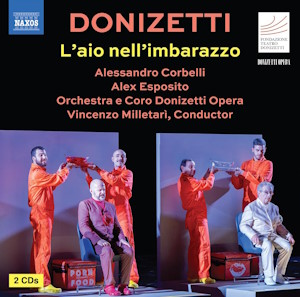
Gaetano Donizetti (1797-1848)
L’aio nell’imbarazzo (1824)
Il marchese Giulio Antiquati – Alessandro Corbelli (baritone)
Gregorio Cordebono – Alex Esposito (bass-baritone)
Orchestra e Coro Donizetti Opera/Vincenzo Milletarì
rec. live, 17, 20 & 26 November 2022, Teatro Donizetti, Bergamo, Italy
Italian libretto and English translation can be accessed online
Reviewed as download
Naxos 8.660565-66 [130]
In the foreword to this issue, conductor Vincenzo Milletarì hails the dramaturgy of Donizetti and continues: “It is one of the first operas that reveals Donizetti’s greatness as a playwright, able to etch the characters and situations with a music that becomes, in itself, theatre.” He also points out that the characters are believable and can be understood even today. To my mind, the most revolutionary is a young woman who dares to oppose established social conventions and preaches Women’s Lib almost a century before it actually happened. The only reason that this could have been accepted in 1824 is that the work is a comedy and was regarded as a parody – but basically this is as mind-boggling as Nora’s decision in Ibsen’s A Doll’s House (1876) to leave her husband and live an independent life.
The storyof L’aio nell’imbarazzo (The Tutor’s Embarrassment) is simple enough: Il marchese Giulio Antiquati is a wealthy widower who has two sons, Enrico and Pippetto. He wants them to grow up without being exposed to the temptations of life, and most of all he wants to protect them from meeting women. He hires a tutor, Gregorio Cordebono, a good-hearted (hence the nominally determinative surname) man who promises to take good care of the two youngsters. When he becomes closer acquainted with them it turns out that the harm has already been done; Enrico is already secretly married to Gilda and they have a son together. Pippetto also has a relationship with Leonarda, who is a good deal older than he. This leads to serious complications for Gregorio, who must do his utmost to hide this from Giulio when he returns from a journey. What follows is an embarrassing hide-and-seek game, where Giulio step by step begins to understand the state of affairs, which of course makes him furious – but since this is a comedy, everything is sorted out for the best. Enrico and Gilda eventually get Giulio’s blessing, while Leonarda and Pippetto agree that they didn’t really love each other. On the surface, L’aio nell’imbarazzo can be seen as a harmless and entertaining comedy of no substantial serious value, but from another perspective it can be interpreted as an making an early contribution to a deeper debate, as I hinted at in the first paragraph – a standpoint that I obviously share with Maestro Milletarì.
Donizetti was 27 when he wrote L’aio nell’imbarazzo in 1824, so he was already a seasoned composer with fourteen operas under his belt, and his melodic vein is already striking in the joyful overture, which after a gloomy opening glitters with the flutes in high spirits. The gloominess returns a couple of times, to warn the listeners that there will be complications further on. There are several attractive arias: Giulio’s cavatina is memorable and in due time both Enrico and Gilda each get a cavatina, the latter adorned with generous coloratura. There are also some buffo numbers with some spectacular patter singing. As is so often the case, one is stunned by the melodious richness that flows from Donizetti’s pen. The first act finale and long stretches of the second act is dominated by the chaotic situations and Giulio’s uninhibited wrath, but when everything is sorted out we get a jubilant finale, where Gilda hails the power of woman in an ecstatic and splendorous aria with coloratura galore and reeking of pathos.
Maestro Milletarì pilots his Bergamasque forces through this lovely score with precision, and the audience obviously appreciate what they hear and see. There is plenty of applause, sometimes faded out, and also stage noise, but that only contributes to the atmosphere of the performance. It must be said that the singing actors do a splendid job. The driving forces are of course Alessandro Corbelli’s Giulio and Alex Esposito’s Gregorio, two experienced buffo experts with splendid timing. Corbelli was 70 when the recording was made, and of course one can hear that his voice is elderly, but he is in full control of his vocal means and so expressive. Esposito is almost a quarter-century younger but still has lots of experience. Francesco Lucii as Enrico sports a beautiful lyrical tenor and sings elegantly, mastering the high tessitura with ease. Marilena Ruta as Gilda also impresses greatly. The rest of the ensemble have less to do but fulfil their tasks with aplomb. The opera as such may not be a forgotten masterwork, but L’aio nell’imbarazzo is certainly worth rescuing from the almost total oblivion it has suffered from for 200 years.
Göran Forsling
Buying this recording via a link below generates revenue for MWI, which helps the site remain free



Other cast
Il marchese Enrico – Francesco Lucii (tenor)
Madama Gilda Tallemanni – Marilena Ruta (soprano)
Il marchese Pippetto – Lorenzo Martelli (tenor)
Leonarda – Caterina Dellaere (mezzo-soprano)
Simone -Lorenzo Liberali (baritone)

















